Sarcasm vs. Irony — What's the Difference?
By Tayyaba Rehman — Updated on September 16, 2023
Sarcasm is the use of words to convey the opposite of their literal meaning, often to mock. Irony is a broader term denoting a discrepancy between appearance and reality, expectation and result, or meaning and expression.

Difference Between Sarcasm and Irony
Table of Contents
ADVERTISEMENT
Key Differences
Sarcasm is a form of verbal irony specifically designed to mock or convey contempt.
Irony refers to a situation or statement where the opposite of what is expected occurs or is said.
Sarcasm often involves a tone of voice that suggests the speaker is not serious.
Irony can be situational, dramatic, or verbal, without necessarily intending mockery or scorn.
Sarcasm is often more direct, aiming at a particular target for its humor, while irony might not target anyone or anything specifically.
ADVERTISEMENT
Comparison Chart
Intent
Often to mock
Varies (not always mock)
Form
Verbal
Situational, Dramatic, Verbal
Tone
Often scornful
Neutral/Varies
Target
Specific target
General/None
Complexity
Simple and direct
Can be complex
Compare with Definitions
Sarcasm
Sarcasm aims for humor at the expense of another.
His sarcasm made everyone laugh, except for the target.
Irony
Irony can be subtle and complex.
The irony in his poem left readers pondering.
Sarcasm
Sarcasm often uses exaggeration for emphasis.
I just love getting parking tickets, he said with sarcasm.
Irony
Irony can occur in language, situations, or even in drama.
The irony in the story made it more intriguing.
Sarcasm
Sarcasm typically has a scornful tone.
Her sarcasm was evident when she said, Oh, a flat tire? Fantastic.
Irony
Irony can be unintentional.
The irony that he missed the Time Management seminar was not lost on him.
Sarcasm
Sarcasm is verbal irony intended to mock or scorn.
Nice job on the presentation, she said sarcastically.
Irony
Irony (from Ancient Greek εἰρωνεία eirōneía 'dissimulation, feigned ignorance'), in its broadest sense, is a rhetorical device, literary technique, or event in which what on the surface appears to be the case or to be expected differs radically from what is actually the case. Irony can be categorized into different types, including verbal irony, dramatic irony, and situational irony.
Sarcasm
Sarcasm is the use of words usually used to either mock or annoy someone, or for humorous purposes. Sarcasm may employ ambivalence, although it is not necessarily ironic.
Irony
The use of words to express something different from and often opposite to their literal meaning.
Sarcasm
A cutting, often ironic remark intended to express contempt or ridicule.
Irony
An expression or utterance marked by a deliberate contrast between apparent and intended meaning
"the embodiment of the waspish don, from his Oxbridge tweeds to the bone-dry ironies of his speech and prose" (Ron Rosenbaum).
Sarcasm
A form of wit characterized by the use of such remarks
Detected a hint of sarcasm in his voice.
Irony
Incongruity between what might be expected and what actually occurs
"Hyde noted the irony of Ireland's copying the nation she most hated" (Richard Kain).
Sarcasm
(uncountable) Use of acerbic language to mock or convey contempt, often using irony and (in speech) often marked by overemphasis and a sneering tone of voice.
Irony
An occurrence, result, or circumstance notable for such incongruity
The ironies of fate. See Usage Note at ironic.
Sarcasm
(countable) An act of sarcasm.
Irony
Dramatic irony.
Sarcasm
A keen, reproachful expression; a satirical remark uttered with some degree of scorn or contempt; a taunt; a gibe; a cutting jest.
The sarcasms of those critics who imagine our art to be a matter of inspiration.
Irony
Socratic irony.
Sarcasm
Witty language used to convey insults or scorn;
He used sarcasm to upset his opponent
Irony is wasted on the stupid
Satire is a sort of glass, wherein beholders do generally discover everybody's face but their own
Irony
(rhetoric) The quality of a statement that, when taken in context, may actually mean something different from, or the opposite of, what is written literally; the use of words expressing something other than their literal intention, often in a humorous context.
Sarcasm
Sarcasm can be cutting or hurtful.
You're a real genius, aren't you? his sarcasm biting.
Irony
(countable) An ironic statement.
Irony
Dramatic irony: a theatrical effect in which the meaning of a situation, or some incongruity in the plot, is understood by the audience, but not by the characters in the play.
Irony
Socratic irony: ignorance feigned for the purpose of confounding or provoking an antagonist.
Irony
(informal){{cite-journal
Irony
Of or pertaining to the metal iron.
The food had an irony taste to it.
Irony
Made or consisting of iron; partaking of iron; iron; as, irony chains; irony particles; - In this sense iron is the more common term.
Irony
Resembling iron in taste, hardness, or other physical property.
Irony
Dissimulation; ignorance feigned for the purpose of confounding or provoking an antagonist.
Irony
A sort of humor, ridicule, or light sarcasm, which adopts a mode of speech the meaning of which is contrary to the literal sense of the words.
Irony
Witty language used to convey insults or scorn;
He used sarcasm to upset his opponent
Irony is wasted on the stupid
Satire is a sort of glass, wherein beholders do generally discover everybody's face but their own
Irony
Incongruity between what might be expected and what actually occurs;
The irony of Ireland's copying the nation she most hated
Irony
A trope that involves incongruity between what is expected and what occurs
Irony
Irony is the discrepancy between expectation and reality.
The irony was that the fire station burned down.
Irony
Irony may not intend to mock or scorn.
Her decision to avoid the highway was ironic when she got lost.
Common Curiosities
What is Sarcasm?
Sarcasm is a form of verbal irony intended to mock or convey contempt.
Is Sarcasm a type of Irony?
Yes, sarcasm is often considered a form of verbal irony.
How can I identify Irony?
Irony usually involves some form of unexpected twist or discrepancy.
Is Sarcasm rude?
Sarcasm can be considered rude, especially if it aims to demean.
Can Sarcasm be written?
Yes, but it's often harder to convey the tone in writing.
What is Irony?
Irony refers to a discrepancy between appearance and reality, often creating a twist.
How can I identify Sarcasm?
Sarcasm often has a scornful or exaggerated tone.
Is Irony the same as coincidence?
No, irony involves a twist or discrepancy, while coincidence is just accidental alignment.
Is Irony always sarcastic?
No, irony can exist without the intent to mock or scorn.
Is Irony always obvious?
No, irony can be subtle and may require thoughtful interpretation.
Can Irony be dramatic?
Yes, dramatic irony occurs when the audience knows something the characters don't.
Why do people use Sarcasm?
People use sarcasm for humor, criticism, or to emphasize a point.
How do I use Sarcasm safely?
Be aware of your audience and context to ensure your sarcasm won't be misunderstood or hurtful.
Can Sarcasm be positive?
While rare, sarcasm can be used in a playful or teasing manner that's not hurtful.
Why do authors use Irony?
Authors use irony to add depth, create tension, or make a statement.
Share Your Discovery

Previous Comparison
Compound vs. Pen
Next Comparison
Tweezer vs. TweezersAuthor Spotlight
Written by
Tayyaba RehmanTayyaba Rehman is a distinguished writer, currently serving as a primary contributor to askdifference.com. As a researcher in semantics and etymology, Tayyaba's passion for the complexity of languages and their distinctions has found a perfect home on the platform. Tayyaba delves into the intricacies of language, distinguishing between commonly confused words and phrases, thereby providing clarity for readers worldwide.















































